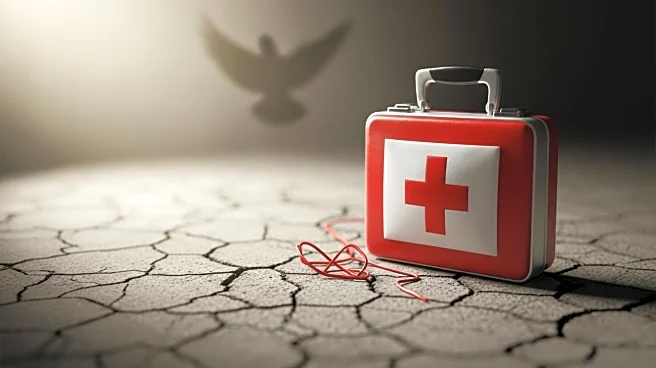What's Happening?
American doctors and nurses have been volunteering in Gaza since 2023, following Israel's bombing of the enclave in retaliation for Hamas attacks. These volunteers, including neurologist Hamid Kadiwala and orthopedic surgeon Mark Perlmutter, have been working under constant threat of violence, with limited access to food and medicine. The recent ceasefire between Israel and Hamas has brought hope for reduced violence, but the humanitarian crisis remains severe. Hospitals are overwhelmed, with patients sharing beds and lying on makeshift mattresses due to limited resources. Volunteers have witnessed the dire conditions firsthand, with hospitals lacking basic supplies like antibiotics and soap, and many children among the casualties. Despite the ceasefire, massive amounts of medical supplies and humanitarian aid are urgently needed.
Why It's Important?
The situation in Gaza highlights the severe humanitarian crisis affecting the region, with significant implications for international relations and humanitarian efforts. The involvement of American medical professionals underscores the global concern and the need for immediate aid. The crisis has strained resources and exposed the vulnerabilities of healthcare systems in conflict zones. The volunteers' experiences have led to increased advocacy for an arms embargo and greater humanitarian support. The ongoing conflict and humanitarian needs in Gaza could influence U.S. foreign policy and humanitarian aid strategies, as well as impact public opinion on U.S. military assistance to Israel.
What's Next?
The ceasefire offers a potential reduction in violence, but the need for humanitarian aid remains critical. American volunteers and advocacy groups are likely to continue pushing for increased aid and policy changes. The situation may prompt further diplomatic efforts to ensure the delivery of necessary supplies and support to Gaza. The international community, including the U.S., may face pressure to address the humanitarian crisis and reassess military assistance policies. Continued advocacy and public awareness efforts by volunteers and organizations could influence future U.S. policy decisions regarding the conflict.
Beyond the Headlines
The experiences of American volunteers in Gaza reveal deeper ethical and humanitarian concerns, including the impact of military actions on civilian populations and the role of international aid in conflict zones. The crisis raises questions about the responsibilities of nations providing military support and the need for comprehensive humanitarian strategies. The personal transformations of volunteers, who have witnessed the devastation firsthand, highlight the moral complexities and emotional toll of working in such environments. Their advocacy efforts may contribute to broader discussions on the ethics of military aid and the importance of prioritizing humanitarian needs.









